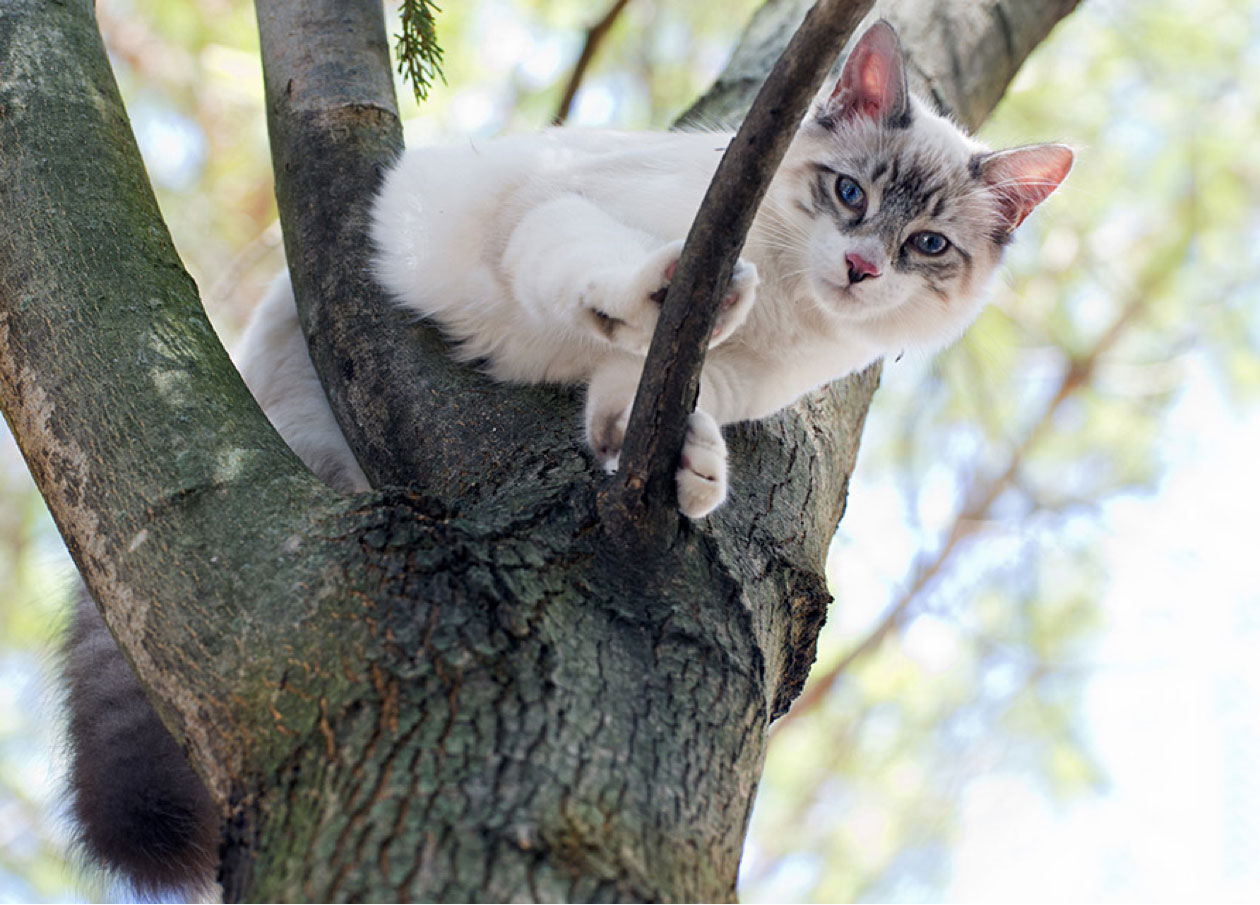
Birman breed guide
Gentle, softly spoken, and happiest when lavished with attention. You can’t miss the people-loving Birman with their full white coat, big blue eyes and long bushy tail. From grooming advice to common health conditions, our guide covers the key things you should know about this affectionate, curious and laid-back cat.
Breed information and advice
Originally bred as a companion cat, the Birman is friendly, quiet and docile but also smart, so while they'll want to be with you, they'll also want to get out and explore. Do not be surprised if you find them hiding out in some unusual places around the house. Here's more you should know:
- This breed loves attention and can get distressed if left alone, so people often keep them in pairs.This breed loves attention and can get distressed if left alone, so people often keep them in pairs.
- Their silky, medium-length coat is fairly low maintenance but will need combing more in the spring when they shed.Their silky, medium-length coat is fairly low maintenance but will need combing more in the spring when they shed.
- They'll typically weigh between 3kg and 6.5kg, when fully grown.They'll typically weigh between 3kg and 6.5kg, when fully grown.
- A healthy Birman will usually live for 16 to 20 years.A healthy Birman will usually live for 16 to 20 years.
Typical size of a Birman: Medium

Recommended exercise and nutrition
Birmans love company, are wonderfully laid-back and will thrive in a house with young children, cats and other animals. Your cat may be naturally quiet, but they're also sturdy, with a nose for adventure and so you may want to keep them indoors. If you want to let them out but feel nervous that their curiosity could get them into scrapes, you could take them out on a cat harness and keep them in after dark.
Cats are meat-eaters and grazers so do not be concerned if your cat picks at their food throughout the day. Birman kittens can be fussy eaters and need to be trained to not beg or demand or occasional treats could become standard fare and they could put on weight. Feed them high-protein, quality meals each day and bear in mind their age, size and lifestyle when working out portions. Always read the instructions on the packet, and avoid milk as it can lead to digestive problems.
Friendly and attentive pets
Affectionate and gentle, your cat will love being fussed by you, your children and friendly animals.

Common health problems and illnesses
Birmans are generally healthy cats but they’ll need regular check-ups and vaccinations to stay in good shape. There are some conditions that this breed may be more prone to, and it’s worth being aware of the main symptoms, so you know what to watch out for.
Kidney disease, when one or both organs are unable to clear waste from the blood properly, can develop naturally as a cat ages. It can also occur due to infection, a tumour, injury or even poisoning. The effects can usually be managed well, and if caught in good time a cat will live a healthy life. Signs to watch out for include loss of appetite or weight, vomiting and diarrhoea.
Cardiomyopathy relates to any disease that affects a cat’s heart muscle, and can affect this breed. Hypertrophic cardiomyopathy is one of the more common of these heart conditions and causes thickening of the heart’s muscles, making it more difficult for the organ to relax between contractions. Keep an eye out for any signs in your cat such as loss of appetite, weakness or difficulty breathing. Speak to your vet, who will be able to do a full examination and advise on treatment options, if you have any concerns.
Find out about insurance for your Birman
Learn how pet insurance works and what kind of cover you might need for your cat.
Grooming advice
Semi-longhaired cats have to be groomed regularly and, although your cat won’t need as much attention as a Persian, their silky hair and skin will definitely benefit from a weekly comb.
Their coat is much less prone to matting and knotting than some long-haired cats. If you need to bathe them, try running a warm shower head over them rather than submerging them in a bath that could be quite daunting.
It’s a good idea to brush their teeth and check the corners of their eyes and inside their ears every week, wiping them with a damp cloth if necessary. Encourage them to manicure their own nails with a scratching post, and be prepared to trim them every couple of weeks if they don’t wear down naturally.
Get them accustomed to their care routine as a kitten to make life easier for both of you. Your Birman is also a hygienic cat and will appreciate a fresh litter tray.
Fun and interesting facts
- As a ‘pointed’ cat, your Birman will be born white and develop different colour fur around their face, tail, ears and lower legs – such as chocolate, lilac or blue.
- They're thought to originally have been bred to be a companion to the holy priests at the Burmese temple of Lao-Tsun.
- They love to play games and can even be taught tricks, such as how to fetch.
- Legend has it a goddess rewarded one cat’s loyalty by turning their eyes blue and their white coat to gold, with the paws always remaining white as a sign of purity.
- Their name comes from a contraction of the French ‘Sacre de Birmanie’, meaning the sacred cat of Burma.
Important information
The content on this page aims to offer an informative introduction to pet breeds, but does not constitute expert veterinary advice. If your dog or cat falls ill or has an injury, contact your vet immediately.
All facts and figures were correct at date of publication and were compiled using a range of sources.
Discover more breeds
Browse our other cat and dog guides to learn about some of the UK’s most popular breeds.